|
|
|
Sort Order |
|
|
|
Items / Page
|
|
|
|
|
|
|
| Srl | Item |
| 1 |
ID:
127617
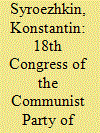

|
|
|
|
|
| Publication |
2013.
|
| Summary/Abstract |
The struggle at the very top of China's political establishment reached its peak on the eve of the 18th Communist Party Congress; this largely predetermined the balance of political forces in the upper echelons of the Communist Party and the decisions of its congress. The compromise about the top figures makes the party's political future very dim indeed. Although the retreating Hu-Wen Tandem managed to hold its ground, it is too early to say that the "reformers" have scored a final victory: in many respects the 18th Congress proved to be "transitional."
The final balance of power will become clear in five years' time after the next, 19th CPC Congress. It will probably clarify the course of the "fifth generation" of the country's leaders. It seems that the next five years can be best described as time of compromises. One has to admit that the criticized Hu-Wen Tandem left the country in fairly good shape; it compiled a reasonable "roadmap" with no alternative on the horizon.
It remains to be seen whether the new party and country leaders will manage in the next five years to avert social upheavals and fulfill the tasks formulated by the 18th Congress while following the roadmap.
|
|
|
|
|
|
|
|
|
|
|
|
|
|
|
|
| 2 |
ID:
160649
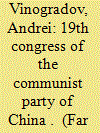

|
|
|
|
|
| Summary/Abstract |
This article considers the main provisions and possible domestic and foreign consequences of the 19th Congress of the Communist Party of China. Special attention is given to the main tenets of the era's theory of socialism with a Chinese face; the problems, conflicts, and challenges China faces from today's world development; the need to change China's model of development; and the role of Xi Jinping in shaping the CPC's ideological and theoretical doctrine.
|
|
|
|
|
|
|
|
|
|
|
|
|
|
|
|
| 3 |
ID:
140683
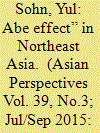

|
|
|
|
|
| Summary/Abstract |
IN DECEMBER 2012 ABE SHINZO RETURNED TO POWER AFTER FIVE years in the political wilderness. Since taking office he has solidified his political leadership by winning all successive elections, paving the way to becoming one of the longest tenured premiers in postwar Japan. His security and foreign policies have already changed the landscape of international relations in East Asia as Tokyo’s relations with Seoul and Beijing spiraled down to new lows for the post–Cold War era. Abe’s new security policy, under the slogan “Proactive Contribution to Peace,” helped bring the Japan-US alliance to an unprecedented level of closeness, clearly pitted against China. The Abe government is also potentially challenging the China-centered new economic order by promoting the US-led Trans-Pacific Partnership (TPP) trade network. Abe’s decision to enter the TPP talks became a game changer in the race for free trade agreements in Asia and the Pacific.
|
|
|
|
|
|
|
|
|
|
|
|
|
|
|
|
| 4 |
ID:
135540
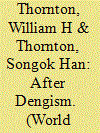

|
|
|
|
|
| Summary/Abstract |
The seeming departure of president Xi Jinping from Deng Xiaoping’s “pragmatic” moderation owes much to a highly tendentious misrepresentation of Deng’s core objectives. For 35 years, Dengism has been viewed through a globalist lens that flatly contrasts it with Maoist authoritarianism. From a post globalist vantage however, it appears that Deng’s reforms reconfigured rather than ended statist oppression. dengism was born out of the recognition that capitalism and authoritarianism were fully compatible and together were crucial for the survival of the CCP. “Opening China” China was Deng’s ironic mechanism for safeguarding against claims, which mandate a liberal corrective that Xi fears more than any other international contest. What he and other CCP elites dread most is a liberal post-globalisation that could foment a grassroots “China Spring”.
|
|
|
|
|
|
|
|
|
|
|
|
|
|
|
|
| 5 |
ID:
158945
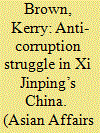

|
|
|
|
|
| Summary/Abstract |
The fact that the extensive anti-corruption struggle that has consumed China since 2013 is highly political is widely accepted and understood. But the question is precisely what political strategy it is directed at – that of bolstering the position of the current supreme leader, Xi Jinping. Or for the preservation of the Party itself. There is a huge difference between these. The first simply means in effect the replacement of one corruptible elite by another. The second means a titanic struggle to change the Chinese communist party culture of power, and to make it enduring and sustainable.
|
|
|
|
|
|
|
|
|
|
|
|
|
|
|
|
| 6 |
ID:
166012
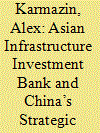

|
|
|
|
|
| Summary/Abstract |
Creating the Asian Infrastructure Investment Bank (AIIB), a multilateral development bank initiated by the People’s Republic of China, has been one of the key symptoms of Xi Jinping’s ambitious “China Dream” foreign policy. The previous studies mainly focused on providing a description of AIIB’s creation or general motives and context through which they explicated the establishment of the Bank. Building on the literature focused on strategic culture and grand strategy, I supplement the general motives of AIIB’s creation by characterizing the style and process of AIIB’s materialization. I argue that the style (procedure) of AIIB’s implementation largely resembles the previous Dengian model of strategic procedure which Deng himself described with the Chinese saying “crossing the river by touching the stones” which evinces flexibility and “step-by-step” characteristics in its procedure. This helps to illustrate that China’s engagement with the international order can be adaptive to a significant degree and China does not necessarily follow a pre-planned vision of how to take over international (institutional) order. While China’s foreign policy in some areas is often regarded as being assertive and rigidly defending its positions, AIIB is a different case to a high extent. Moreover, analyzing the creation of AIIB indicates ambiguity of Xi’s foreign policy regarding general aims it wants to achieve and identities on which it should be based.
|
|
|
|
|
|
|
|
|
|
|
|
|
|
|
|
| 7 |
ID:
138128


|
|
|
|
|
| Summary/Abstract |
In November 2012, soon after the conclusion of the 18th National Congress of the Communist Party of China (CPC), President Xi Jinping put forward for the first time the idea of the ‘Chinese Dream’. In March 2013, Xi further elaborated on this concept at the closing ceremony of the First Session of the 12th National People’s Congress. Xi’s concept of the Chinese Dream involves better education, more stable employment, higher incomes, a greater degree of social security, better medical and health care, improved housing conditions, a better environment, satisfactory jobs and better lives for the Chinese people. In foreign affairs, Xi emphasised that the Chinese Dream stands for peace, development, cooperation and mutual benefit for all. These are all unexceptional sentiments that could have been expressed by any national leader and thus few would disagree with Xi’s laudable thoughts. But what is the position on the ground and how is China faring under Xi Jinping’s rule in the achievement of these goals?
|
|
|
|
|
|
|
|
|
|
|
|
|
|
|
|
| 8 |
ID:
131203


|
|
|
| 9 |
ID:
160839


|
|
|
|
|
| Summary/Abstract |
In the reform era, management of information by the Chinese Communist Party has been continuously moving away from explicit, crude tactics of the past toward more subtle and orderly mechanisms of the present. This study examines one facet of this transformation in the online sphere: digital persuasion. Drawing on three emerging trends in online persuasion, including official digital revamping of state media, expansion of government Weibo, and official promotion of patriotic bloggers, the authors explain how online persuasion is taking on an increasingly participatory form under President Xi. Specifically, the conceptualization of ‘authoritarian participatory persuasion 2.0’ includes direct co-production of persuasion, with netizens called to repost, share and create content, as well as the indirect participation, whereby netizens are invited to partake in the life of the top leader, Xi Jinping, and to consume exclusive practical tips provided by the state. The participatory digital persuasion, whereas intended to facilitate public complicity with the regime, has also opened up spaces for satire and ‘incivility’ unmasking and challenging the state’s covert propaganda practices.
|
|
|
|
|
|
|
|
|
|
|
|
|
|
|
|
| 10 |
ID:
161970


|
|
|
|
|
| Summary/Abstract |
This article places Xi Jinping’s accumulation of personal power and top-down crusade against bureaucratic corruption in broader historical perspective. His moves are a response to China’s distinctive political and economic trajectory in the era of reform, one that for the first time makes possible the accumulation of property and wealth by the families of officials. Although Xi’s approach is often seen as a throwback to practices of the Mao era, it in fact revives the bureaucratic legacy of Liu Shaoqi, not the anti-elitist radicalism of Mao Zedong. China’s problem of bureaucratic corruption has little precedent in the history of the Communist Party of China, or of the Soviet Union in the past, but bears eerie parallels with the problems that beset the Guomindang during its years on the Mainland.
|
|
|
|
|
|
|
|
|
|
|
|
|
|
|
|
| 11 |
ID:
174919
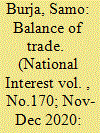

|
|
|
| 12 |
ID:
185563
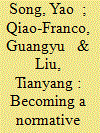

|
|
|
|
|
| Summary/Abstract |
Maintaining robust diplomatic relationships with neighbouring countries in the Mekong region has become strategically critical to China. Since President Xi Jinping took office, China has been renovating normative power in the Mekong region, endeavouring to socialize the Mekong countries into accepting normative Chinese concepts, such as ‘community of shared destiny’, by mobilizing and reconfiguring their material and normative recourses. This article argues that China's normative power stems from two primary mechanisms: 1) an organized, top-down diffusion driven by political elites, involving inter-governmental dialogues, socialization via bilateral and multilateral cooperation mechanisms, and negotiations with countries co-opted into China-led connectivity and infrastructure initiatives; 2) a bottom-up diffusion of ideas from practices (i.e. exchange of goods, trade, aid) and the physical presence of China in the Mekong region, exemplified by the massive scale of infrastructure widely constructed in the region. Taken together, China's expanded normative engagement in the Mekong subregion is comprised of multiple, oscillating modes of normative production that have been ‘synchronized’ across riparian countries with varied geoeconomic and geopolitical circumstances. Our findings suggest that while normative Chinese discourses have been accepted by the ruling classes of certain Mekong countries, China's attempts to build normative power have been largely shunned by the civil societies in the region.
|
|
|
|
|
|
|
|
|
|
|
|
|
|
|
|
| 13 |
ID:
162061


|
|
|
| 14 |
ID:
119924
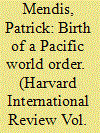

|
|
|
|
|
| Publication |
2012.
|
| Summary/Abstract |
In his re-election night speech in November 2012, President Barack Obama said, "Democracy in a nation of 300 million can be noisy and messy and complicated. We have our own opinions. . . These arguments we have are a mark of our liberty, and we can never forget that as we speak, people in distant nations are risking their lives right now just for a chance to argue about the issues that matter-the chance to cast their ballots like we did today." Soon after the US election, one such distant nation experienced a very different transfer of political power, as current Chinese President Xi Jinping replaced former President Hu Jintao in an orderly, stable, and Confucian manner.
|
|
|
|
|
|
|
|
|
|
|
|
|
|
|
|
| 15 |
ID:
177961
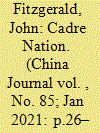

|
|
|
|
|
| Summary/Abstract |
In recent years China’s Communist Party leadership has drawn attention to the lessons of imperial history for China’s modern system of cadre (ganbu) management. The Party’s focus on history draws attention to points of continuity and discontinuity between the bureaucratic systems of the empire and the People’s Republic. This article considers the historical framework of territorial government under which officials operate and the historical trajectory of bureaucratic control over territorially based communities over the longue durée, from the imperial period through the early Republic and into the People’s Republic under Xi Jinping. By approaching the Communist Party’s cadre system as a historical outgrowth of an earlier system of territorial administration, this article brings to light assumptions dating from the late imperial period that continue to underpin the exclusive power and privileges attached to the position of officials in China, which create, in effect, a nation of cadres.
|
|
|
|
|
|
|
|
|
|
|
|
|
|
|
|
| 16 |
ID:
161977
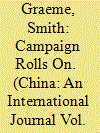

|
|
|
|
|
| Summary/Abstract |
The broad aim of this article is to analyse the institutions of China’s rural local governments in their own right, and thus further our understanding of the political and social mechanisms that maintain and support them. What changes do rural officials’ evolving notions of “development” and “modernisation” under Xi Jinping bring? What shifts can we detect? This article focuses on two developments under Xi: the increased role of the Party-led “leading small groups” in Chinese local governments, and Xi’s “war on poverty”, which aims to lift all Chinese citizens out of poverty by 2020 through a mixture of targeted fiscal support and compulsory resettlement of millions of rural residents. Examining these developments sheds some insights into Xi’s efforts to remodel the Chinese polity and society. Do they represent a real break with past practice, or do they provide evidence of continuity with previous trends in China’s institutions of rural governance?
|
|
|
|
|
|
|
|
|
|
|
|
|
|
|
|
| 17 |
ID:
193213
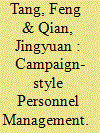

|
|
|
|
|
| Summary/Abstract |
The anti-corruption campaign launched by General Secretary Xi Jinping has been one of the most far-reaching bureaucratic overhauls in modern Chinese history. How has Xi's crackdown on corruption shaped bureaucratic selection at the sub-provincial level? In this paper, we find that the purge has influenced how local ties are weighed in the appointment of prefecture city leaders. While it is common for provincial Party chiefs to appoint locally embedded officials to govern localities without high-profile corruption cases, they tend to appoint outside officials without local experience and connections to manage cities whose ex-leaders have recently been prosecuted for corruption. We argue that the provincial leaders’ objective of installing non-local officials is to exert hierarchical control and oversight in localities affected by corruption. Using an original dataset of all Party secretaries from China's 287 prefecture-level cities between 2013 and 2020, we find a significant divergence in the local embeddedness of officials who are appointed to replace corrupt ex-leaders and the embeddedness of those who fill the vacancies of transferred or retired predecessors. Our study sheds light on how Xi's anti-corruption campaign has reshaped the central–local relations and the logic of political control in China.
|
|
|
|
|
|
|
|
|
|
|
|
|
|
|
|
| 18 |
ID:
129686
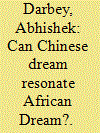

|
|
|
|
|
| Publication |
2014.
|
| Summary/Abstract |
Chinese Dream was officially put forward on November 29, 2012 by the Chinese general Secretary Xi jinping in the meeting of 18th national congress of the communist party of China, as the important guideline ideology and important governance philosophy. Xi defined Chinese dream as to achieve the great rejuvenation of Chinese nation in the greatest dream of the Chinese nation in modern times. The core objective of the Chinese dream can be summarized as the goal of "two Hundred Year", which can be elaborated as, the year 2021 is the 100th anniversary of the communist party of China and the year 2049 is the 100th anniversary of the Peoples Republic of China.
|
|
|
|
|
|
|
|
|
|
|
|
|
|
|
|
| 19 |
ID:
123363
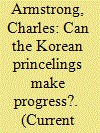

|
|
|
|
|
| Publication |
2013.
|
| Summary/Abstract |
North and South Korea's leaders are both scions of ruling families with a history of mutual hostility. Still, there is cause to hope that the South's Park Geun-hye will try what is long overdue: clear-headed, sustained engagement with the North.
|
|
|
|
|
|
|
|
|
|
|
|
|
|
|
|
| 20 |
ID:
129649
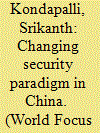

|
|
|
|
|
| Publication |
2014.
|
| Summary/Abstract |
At the third plenum of the 18th Communist Party Congress on November 9-12, 2013 China's new leadership that took over in late 2014 announced the formation of a new national security Commission, apart from re-organising the economic sector of the country. These two issues- reorganising China's policy structures into main two modularized priority entities in economic and security domains- are expected to last at least till the next decade and beyond. Indeed, these are expected to change how the security paradigm in China is to be viewed by the outside world. In early 2014, it was announced that the new leader Xi Jinping will head this commission, in addition to his duties as general secretary of the communist party, President of the republic, and Chairman of the Central Military commission.
|
|
|
|
|
|
|
|
|
|
|
|
|
|
|
|
|
|
|
|
|